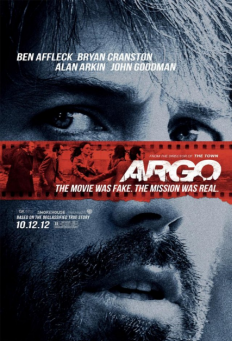Print Edition: October 24, 2012
 Whenever a movie is talked about as being “political,” this usually indicates its content is in some way related to governmental politics, and this makes it more important, mature and worth taking seriously than other, supposedly apolitical movies. This rather useless title, at least in the way it is most commonly used, addresses the appearance of certain traits, but not the way they are treated, which is where the division between what is thought provoking and simply risible lies. Argo—a movie that depicts events surrounding the Iran hostage crisis that began in 1979—has international relationships and political decisions as part of its built-in narrative. But to director Ben Affleck, engaging with political ideas or approaching its subject matter in an open, considered way seems less important than falling back to a time when things went right as either lesson for today or cheap heroism. Both prove problematic.
Whenever a movie is talked about as being “political,” this usually indicates its content is in some way related to governmental politics, and this makes it more important, mature and worth taking seriously than other, supposedly apolitical movies. This rather useless title, at least in the way it is most commonly used, addresses the appearance of certain traits, but not the way they are treated, which is where the division between what is thought provoking and simply risible lies. Argo—a movie that depicts events surrounding the Iran hostage crisis that began in 1979—has international relationships and political decisions as part of its built-in narrative. But to director Ben Affleck, engaging with political ideas or approaching its subject matter in an open, considered way seems less important than falling back to a time when things went right as either lesson for today or cheap heroism. Both prove problematic.
Argo—despite its attempts through third-rate Oliver Stone film stock-switching and credit-overlay slideshow matches between movie and life—is defined not by its political truth or historical recreation (it fudges both) but the presence of Ben Affleck as actor (playing CIA operative Tony Mendez) and director. While Iran is where the movie is based, Affleck sees fit to spend an almost equal amount of time in America, either at CIA headquarters or in tonally-jarring Hollywood backlots, where the film crew cover of the hostages’ planned escape is conceived and developed. The assertiveness of the movie industry as instrumental in historically-upheld action is obvious, and equally thudding in its deployment. In one scene, two media events are equalized in importance by being placed together within a scene – one in Iran, the other in colorful press-filled spectacular Los Angeles set.
From the opening scenes, where walls are climbed and hostages taken, Affleck gravitates toward showing events crosscut rather than as unbroken moments in time. This divided approach builds a wider range of tension mounting and time running out, but as Affleck continues to return to this mode of looking through multiple, often unrelated perspectives (for example, a gate interrogation interrupting a highly visible journey out) Argo grows into its finished form: messy, elongated history turned into the broadly schematic. This is less the story of the hostages and what they go through, or in a greater sense what these two countries are going through, and more the hero’s minor crises and thorough journey to stardom. This is reflected in the narrative, which moves from plot point to plot point so quickly there’s no time to stop and think about the world outside. Just keep up with the plan and everything will take care of itself. This sheltered, closed structure doesn’t have room for anything that might make the reason for the hostage-taking, an outpouring of protest, palpable either as recognizable threat or conflicting reason.
At one point footage of Jimmy Carter (responding to the crisis) plays; he is heard saying “The actions of Iran have shocked the civilized world.” Argo is a movie made and released in this year, making the actions as attributable to Iran anything but shocking, a reinforcement of cultural attitudes, one where the distinction of civilized/not still holds sway in some circles. The plot demands a villain, and this situation provides one in the easiest of places – not a single Iranian, even those that are seen in fear in the opening (though we stay with the Americans), about to be endangered by their own people, is granted a distinct, listenable voice. They’re just noisy obstacles. There is no acknowledgement of the proximity to reality or the future after the fallout for Iran in the orchestral credits, but that’s the power of Hollywood, meticulously restoring its shining, treasured moments, while letting less easily explained, less profitable ones dwindle in memory, eventually decayed and forgotten in some archive.
But is the ignorance of the deeper ramifications of their actions, the attention instead paid to the simplification of a “thrilling” extrication mission, exactly what Affleck is trying to show? Things do drop into more sober territory as the male hostages try to awaken Mendez to their reality (the women, on the other hand, mostly just sob – even next to Michelle Monaghan and Amy Ryan in Gone Baby Gone or Rebecca Hall in The Town, it’s another step back as Affleck retreats into the past), but Alexandre Desplat’s arm-gripping score and as character, Affleck’s stasis, point otherwise. As director, Affleck is content to hold up swathes of lives and international conflict and ideals of justice with whatever comes after ignored in favour of a roll-credits fist pump.

